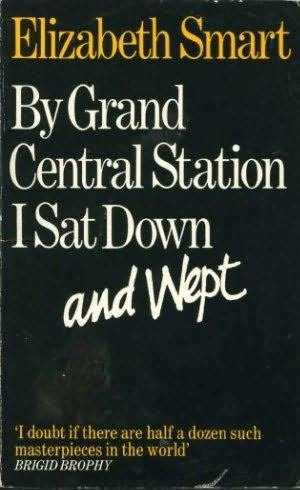|
BY GRAND CENTRAL STATION I SAT DOWN AND WEPT
by ELIZABETH SMART
reviewed by Amy Britton
1943-1945 was clearly a vintage period for that unusual form, poetic
prose. In her introduction to the Panther edition of the text, Brigid
Brophy says that “if poetic prose is the genre which can shew the
fewest masterpieces, it is probably also the genre which can shew the
longest list of truly and abysmally bad books.” So, what are these
few “masterpieces”? Brophy cites Genet as being “the
other supreme prose-poet of our age.” Genet certainly is, along
with Smart, a magnificent prose-poet, and there are comparisons to be
made between the two which do not go unnoticed by Brophy. Both toy with
gender and sexuality, in similar language (Brophy citing the narrators
desire to appeal to her bisexual lover by wishing to “turn into
a printshop boy with armpits like chalices.”)

But to merely draw comparisons between Genet and Smart would be a mistake
– “By Grand Central Station I Sat Down and Wept” is in
many ways a strikingly original piece of writing. There have been many
novels in which the characters encounter the restraints of morality,
but few in which the absurdity of this morality and these apparent restraints
are so severely and yet so subtly mocked. The police interrogation is
sublimely sliced with lines from The Song of Songs; these lines from
the Bible cut and pasted, beautifully mutilated into this “immoral”
escapade. Infidelity is not apologized for – Smart seems to adopt
the Wildean view that the artist can have no ethical sympathies. There
is a mocking of moral boundaries even in her choice of blunt vernacular
(another Genet-like tactic, with his upfront descriptions of masturbation
and passing wind) – in particular, her use of the word “cunt”,
which now appears glib but coming from a woman in 1945 would have come
as a great surprise, even shock.
This rejection of morality transcends the reader’s expectations
of a novel with a title which implies mere traditional, feminine vulnerability.
And yet Brophy points out that it does have “the rhythm of a throb.
The entire book is a wound.” Through a kind of raw Dionysian pleasure
which strips the narrator bare, Smart creates a whole new kind of vulnerability.
Amy Britton
|

